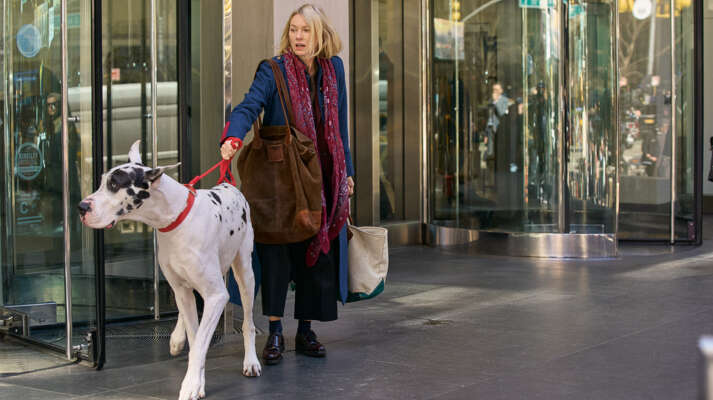Winning the Academy Nicholl Fellowship
How one of the industry's most prestigious screenwriting awards helped Elizabeth Chomko make What They Had.
Winning the Academy Nicholl Fellowship
Written by Peter Bowen
When Elizabeth Chomko moved to Los Angeles, she didn't define herself as a screenwriter. "I had dabbled in the art of screenwriting but was a playwright and actor," explains Chomko. While she had written her entire life, "the inspiration for this story hit me like lightning." Her screenplay What They Had recounts with intimate humor a family in Chicago dealing with their mother's increasing memory loss. Having gotten down the first draft in a three-day writing binge, Chomko continually reworked her script to get every voice just right. "Rewrites felt like time traveling, hanging out with my grandparents again, with my family in Chicago again," Chomko recalls. After three years of hard work and a stint at the Sundance Screenwriters Lab, Chomko was encouraged by a friend to submit What They Had to the Academy Nicholl Fellowship. The day she got the acceptance call was, according to Chomko, "one of the great moments of my life." Academy Writers Branch Governor Robin Swicord, who was on speakerphone along with rest of the committee, told her she was one of the five people to receive the Academy Nicholl Fellowship that year. "I don't recall much of the conversation but I do remember getting off the phone and bursting into tears," says Chomko. "It was a profound confirmation that there was something special about this story and that I was meant to tell it, and it gave me the confidence to pursue making the film with wholehearted abandon."
In 1985, Gee Nicholl (an actress and wife of acclaimed screenwriter Don Nicholl) and Julian Blaustein (producer of such films as Broken Arrow and the The Day the Earth Stood Still) proposed a plan to the Academy of Motion Picture Arts and Sciences to support emerging screenwriters. This plan was called the Don and Gee Nicholl Fellowship in Screenwriting, which eventually became the Academy Nicholl Fellowships. The competition-which originally was restricted to California college students-awarded its first fellowships to Allison Anders (who went on to be an acclaimed independent filmmaker), Jeffrey Eugenides (who became a Pulitzer Prize-winning novelist), and Dennis Clontz (who turned into a noted playwright and a Pulitzer Prize-winning journalist). In time the rules changed to encourage more participants: In 1989, the competition was opened up to any U.S. citizen who had neither sold, nor optioned, a screenplay; in 1991, it was changed to anyone (in the US or elsewhere) writing in English; In 2001, it permitted writing teams of two to apply.
While the requirements for application changed over the years, the quality of the winners and the prestige the award bestowed remained the same. In 2014, the year before Chomko submitted What They Had, over 7,500 screenplays were submitted for the Nicholl, a number that was winnowed down with each round. From the pool of initial applicants, about 370 were selected as Quarterfinalists, 130 as Semifinalists, and about 10 as Finalists, before the judges select the final five. Those five received $35,000 to support them while they wrote an original feature screenplay during their Fellowship year. In addition, winners are asked to join in the awards week ceremonies and seminars. While not every winning screenplay has been produced, many fellows have had their careers launched by the Nicholl. 1998 fellow Mike Rich's entry script Finding Forrester was produced, becoming Gus Van Sant's 2000 feature of the same name. 2000 fellow Doug Atchison went on to direct his entry Akeelah and the Bee. 1992 fellow Susannah Grant went on to write the screenplay for Erin Brockovich, for which she received an Academy Award nomination.
For screenwriters, often working in solitude, the Nicholl provides connection with other artists. Chomko notes, "The community I met through the Nicholl are writers and filmmakers at all stages of their careers, up to the very topmost echelon of accomplishment and talent, in all departments of the filmmaking arts and industry." In addition to what Chomko describes as "a huge affirmation of my vision for the film," the Nicholl can lead to the film being made. For Chomko, "it provided the introduction to Albert Berger, who was a member of the committee, and his partner Ron Yerxa. They came aboard to produce What They Had along with independent producer Bill Holderman. Albert and Ron's outstanding reputation as producers and their faith in the material and me as a first time filmmaker inspired A-list talent to take the same leap of faith."
A remarkable cast, including Hilary Swank, Blythe Danner, Robert Forster, Michael Shannon, and Taissa Farmiga, were drawn to the project by the power, humor, and authenticity of Chomko's words. Forster, who remembers feeling "I heard my own voice as I read the script," immediately perceived Chomko's talent and hard work. "She had given a great deal of thought to each moment and each word," Forster exclaims. "She has a good ear for what sounds true." Danner, who had been working non-stop, wasn't sure she wanted to make another film, but, as she recalls, "the script was so wonderful that I had to come on board."
As a filmmaker (and an actor), Chomko also intuitively understood how her cast would bring her words to life in their own special way. Rewriting the screenplay to fit her actors proved "one of the best parts of the process… They each brought something personal to this story. I wanted to make magic out of that." Swank, who plays Bridget, a mother who returns to Chicago from Los Angeles to help her ailing mother (Danner) only to realize the crisis in her own life as well, embraced Chomko's openness. "As a writer she got to the heart of the matter on the page and as a director saw that through without being married to the words," notes Swank. For Chomko, working with actors served as the final polish on her award-winning script. "My rewriting was inspired by all that Hilary is," exclaims Chomko. "She had insights into the character that pushed the script leaps and bounds."
The story that hit Chomko "like lightning" so many years ago is now coming to a theater near you. It's a long, difficult journey from inspiration to a fully developed screenplay that is produced into in a feature film. For Chomko, winning the Academy Nicholl Fellowship proved that the emotional force that pushed her to tell this story was not lost in the writing. Indeed, critical reception proves just how successfully her heart, humor, and humanity made it to the screen. "There's raw power in Chomko's writing, but so much scrupulousness and craft that you feel safe when the time comes to weep," exclaims New York Magazine's David Edelstein.


